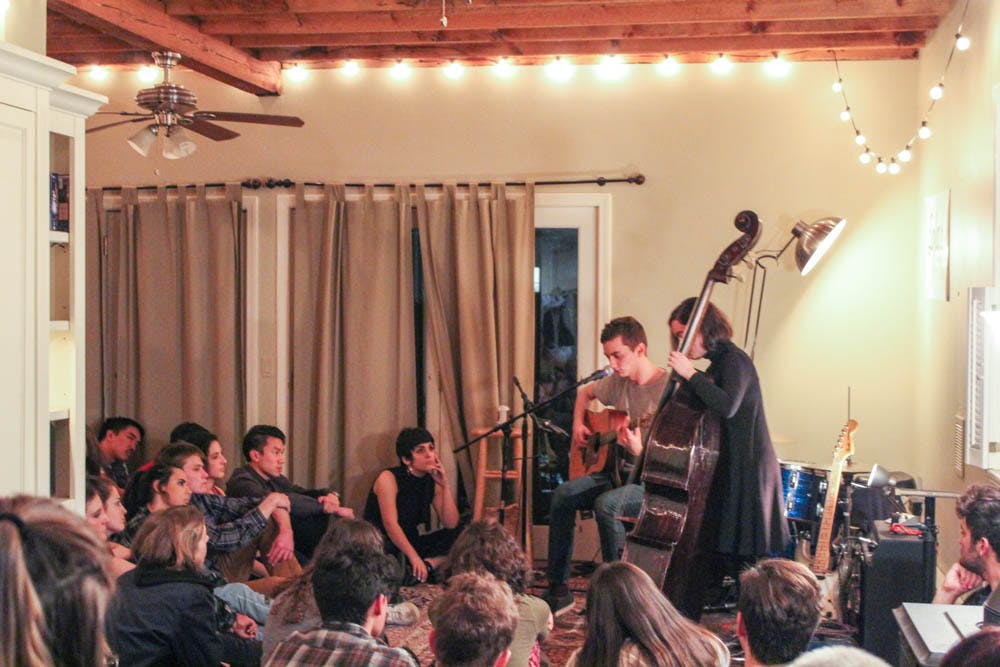Guided by the lights of their cell phones and an address revealed only the day before, a crowd arrived at an anonymous house on Orchard Street Sunday night. At first, there was a trickle of people coming in, a few individuals scattered on chairs — mostly Brown students dressed in Doc Martens, maroon sweaters and flannels. A crowd of representatives from the women’s cross country team sat on the couch, a few upperclassmen crouched against the wall and, in the kitchen, a group of students stood in T-shirts that read “Be still and know.” There were also outliers, such as middle-aged Michael and Sue from Massachusetts who had heard about the event on CBS. A mountain of belongings accumulated in the doorway — a Brown crew backpack, coats ranging from puffy-fur hybrids to well-worn jean jackets and the casual, but not pervasive, beer bottle or can. In the back rested a pile of sound equipment: drums, a microphone and various amps. As 8:30 p.m. approached, three bands remained disguised among the chattering onlookers.
Sofar Sounds is an elusive worldwide organization that sponsors gigs as far as Bombay, India and as close as Providence. The organization attempts to create an intimate space for purified music listening, which means no phones, no chatting during the set and no walking out halfway through the show. “Everyone is listening so intently, and there is so much respect for the artist” said Lindsay Sack ’19, media manager of Sofar Sounds Providence. To accomplish this, Sofar Sounds requires each potential audience member to apply for a spot at the concert. From the applicant pool, local volunteer organizers select an inclusive mix, attempting to allot spots equally among genders, while also considering previous attendance to maintain a strong fan base.
“Every show is completely different — you go to a show, and you never know what you’re going to get,” said David Sasson ’17, co-founder of Sofar Sounds Providence. For their gigs, which occur once or twice a month, Sofar Sounds Providence often has twice as many applicants as it can feasibly fit. Each attendee has the option to bring a plus-one and pay a donation of a minimum of five dollars. The shows feature three acts that are revealed the day before, along with the location. The bands receive a cut of the donations or an opportunity to appear on the widely-followed Sofar Sounds YouTube channel. Sunday’s show featured Electric Kitty from Brown, Samurai Sword from Connecticut and She Keeps Bees, a Brooklyn-based rock band.
When Electric Kitty took the stage — or what is more accurately described as a corner — the crowd settled into a comfortable, attentive silence. The lead singer, Aidan Cron ’19, started with a description of the band name, which is derived from an incorrect reference to a failed Cold War CIA project. According to Cron, the United States trained a coalition of cats with listening devices implanted in their ears to spy on Soviet generals. The name of the covert operation? Acoustic Kitty.
The band’s energetic acoustic set featured songs with names like “Whiskey Mountain” and “Beach House” that recall a distinctive indie rock subgenre that relies heavily on history and myth. As most of the audience sat on the floor, dancing was limited to light head nodding, which gradually became more intense.
Samurai Sword was up next, and changed the tone entirely. Josh Pavel, the singer-guitarist bashfully thanked “the Sofar dudes, people and stuff” before beginning to play with a brassy, full sound. After a few acoustic songs, Pavel began to sing with a tone at once empathetic, longing and jarring, his hands fluttering tenderly from chord to chord. A cellist dressed in black joined him, and their voices melded beautifully in the space Pavel described as a “really cool wooden room.” At the set’s conclusion, the Sofar organizers invited audience members to tell jokes. Only Pavel volunteered, offering several variants of a theme: “21 Jump Street? What? Were jump streets one through 20 already taken?” “Motel Six? What? Were Motels one through five already taken?” and “27 Dresses? What? Were dresses one through 26 already taken?”
She Keeps Bees, featuring Jessica Larrabee on vocals and guitar alongside her husband, Andy LaPlant, on drums, took the stage last. LaPlant described the duo’s music as rock with “a softness.” Larrabee saw the night as “trying to help with the insanity” of today’s political climate — a moment for “healing and community.” Her stage presence first brought on a comical tone as she engaged in a rambling monologue of self-effacing jokes, cursing and excited encouragement. “I grew my pimple all week for this,” she said. This created a stark contrast when her bubbly chatting abruptly transitioned into a powerful singing voice that struck the audience, filling the room with a soulful poetry. In a timely feminist rock anthem that overwhelmed the audience, Larrabee methodically chanted “Our bodies are our own!”
By the end of the show, there was a sense that something had been accomplished — Sofar Sounds had reached their goal of creating a show that was, as Sack put it, “just magic.” And this isn’t the first time, either. For Sack, Sofar Sounds provides “those few hours every month to connect to music and to connect to people.”
Since Sasson and Jaclyn Licht ’16 started Sofar Sounds Providence, shows have occurred everywhere from Dave’s Coffee and an overheated attic in the summer to a tiny room at WBRU radio station’s headquarters. Some have involved ten-person funk bands, acts like Busty and the Bass, Lawrence and Wild Rivers and, once, an impromptu second show when the band showed up four hours late. Once, a venue even loaned out Polaroids so audience members could take pictures.
While Sofar Sounds maintains an air of mystery, Brown community members are encouraged to get involved, whether as organizers or audience members. The events are generally close to campus, Sasson said, and they are always open to new volunteers, guests and venues.





